
10 minute read
Going Against the Grain
Class of '76 Brewers & Distillers
Three members of the class of 1976 are pathfinders in the trendy field of craft brewing and craft distilling. Their journeys have been different – but each involves risk-taking and trend-spotting.
By Henry McNulty '65
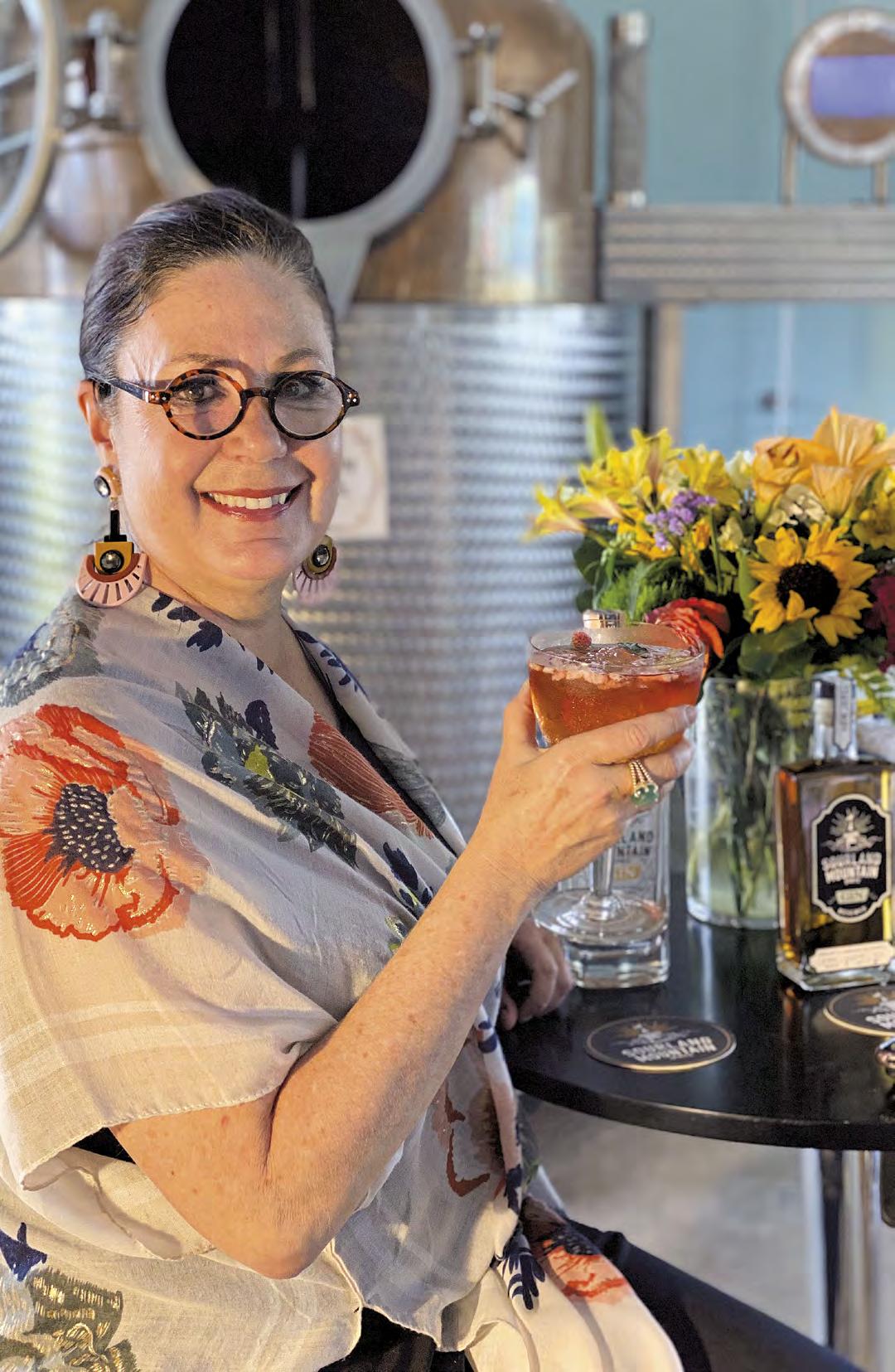
Erica Disch ’76, co-founder of New Jersey’s Sourland Mountain Spirits.
–ERICA DISCH ’76
Brewery to Distillery
Erica Disch '76, co-founder of New Jersey’s Sourland Mountain Spirits, says her time in Wallingford “provided me with lifelong friends and a love for the pursuit of learning, instilled by memorable teachers.”
After Choate Rosemary Hall, Erica graduated from Georgetown with a degree in Spanish, her love of language ignited by her classes with Mr. Lopez. She taught Spanish for 15 years, then went into product marketing and advertising in New York City before moving to New Jersey. She and her husband, Ray, were co-founders and ground-floor investors in Triumph Brewing Company, a brewpub in Princeton, with a few hurdles to overcome: “We had no money, no restaurant experience, and brewpubs were illegal,” she says.
“Ray came home one day and said he was listening to a story from NPR on his drive to work,” Erica remembers. “It was about a husband and wife who opened a successful microbrewery in Chicago; he said, ‘E, we can do this.’ But first, the law had to be changed in New Jersey to legalize craft brewing, which had been illegal since Prohibition.” After that, the couple soon turned Triumph into a local institution.
But it wasn’t enough. “After Triumph, and the founding of numerous other businesses, Ray was always looking to get back to making something,” she says. “In 2013, when craft distilleries were first legalized in the state, Ray felt that the craft distilling market was in a similar place as craft brewing had been when we started Triumph, and that it was the right time to get into the booze business again.” Sourland Mountain Spirits was born.
New Jersey’s Sourland Mountains “have a rich history of farmers, bootleggers, rebels and patriots, fine craftsmen and artisans,” Erica says. “It was the perfect setting for our distillery. This, combined with finding a location on a farm down the road that had a farm-to-fork restaurant along with a microbrewery, provided the incentive to move forward.”
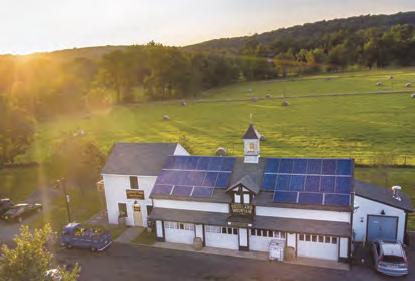
Sourland Mountain Spirits tucked away in the Sourland hills of Hopewell, New Jersey.
Since then, the awards have, so to speak, flowed in. “We were able to sell our first bottle of gin in 2017,” she says. “In 2018, we were selected as the farm distillery of the year by the America Distilling Institute. Our proudest moment came in 2020, when our gin received a double Gold Medal from the American Distilling Institute.” Sourland’s Vodka, a silver medal winner, is another popular seller. Their Pride Vodka, sold in a rainbow-decorated bottle, celebrates the accomplishments of the LGBTQ+ community, with portions of the proceeds going to a local LGBTQ+ support center. They also distill a two-year straight bourbon whiskey, spiced rum, coffee liqueur, and a “reserve gin,” aged for nine months in white oak new American barrels, lightly charred. “Customers describe it as if whiskey and gin had a baby,” Erica says.
Never ones to miss a trend, Erica and Ray, who live and work in Hopewell, N.J., were able to pivot last year with the arrival of the coronavirus. “With the advent of COVID-19 our son, Sage, joined the team,” she says, “and we changed to producing hand sanitizer, which we provided to essential workers and consumers.”
Steins to Stout
Mention the name Tod Mott ’76 to beer enthusiasts, and one brew is likely to be mentioned first: Russian Imperial Stout. It’s the ale Tod is probably known best for, but his decades-long brewing career doesn’t involve just one brew; it has taken many twists and turns.

Tod Mott, co-founder, and brewmaster of Tributary Brewing Company, Kittery, Maine.
At Choate, he says, “what I learned helped me integrate into college-level life: being able to interact with women and have spontaneous discourse with my teachers.” After earning degrees in ceramics from Denison, the Kansas City Art Institute, and Boston University, Tod looked for a college-level job teaching ceramics, only to find that such opportunities were rare.
There was, however, beer. “I started making beer in graduate school in order to help while firing kilns,” he explains. “It takes a long time to fire off a kiln in very warm temperatures, hydration is key, and beer goes well with the rhythm of firing a kiln!” Using a homebrew kit his wife gave him, Tod brewed on the weekends while working in a ceramics studio. “I joined a homebrew club called the Boston Wort Processors,” he says, “wort being the extract of water and malted barley that starts the brewing process. I found many similarities between making pots or clay vessels and beer: recipe formulation, time and temperature, chemistry, microbiology, patience, and a certain amount of magic.”
He had found his calling. “While winning most of the local homebrew competitions, I thought I should try more regionals,” he says. “I was up against some very talented brewers, including Phil Markowski at Two Roads Brewing Co.,” who later partnered with Whitney George, Tod’s Choate ’76 classmate.
Tod’s journey for the past 30 years reads like a who’s who of New England craft brewing: Catamount in White Junction, Vt.; Harpoon Brewery in Windsor, Vt., where he formulated Harpoon’s India Pale Ale; Commonwealth Brewing in Boston and New York; Back Bay Brewing in Boston; Quincy Ships Brewing; Portsmouth Brewery; and, in 2014, his own business, Tributary Brewing Co. in Kittery, Maine.
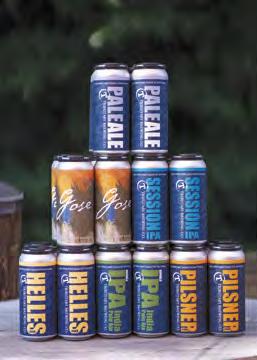
Tributary’s products are made in small batches, conserving water and demonstrating the company’s commitment to sustainability.
“The name Tributary came to my wife of 37 years, Galen, when we ran the Colorado River through the Grand Canyon after leaving Portsmouth Brewery in October 2012,” Tod explains. “We were working on our business plan to open a small brewery utilizing the knowledge I’d accrued over the past 24 years working in other breweries. As we were flying into Flagstaff to run the Colorado, Galen nudged me and said she had the perfect name: Tributary. Southern Maine has many rivers and their tributaries, so it fit.”
Then came the hard part: “finding a space, negotiating the lease, finding funding, hiring a good general contractor, buying brewery equipment, setting up brewing operations, along with all aspects of retail in a tasting room from furniture, bathroom fittings, color schemes, billing and invoicing – and worrying about if we made the right decision about opening a brewery!”
About the famous Russian Imperial Stout: When he was at the Portsmouth Brewery, Tod named his creation “Kate the Great” – a reference to the empress Catherine the Great. On leaving the company, he was allowed to take his formula, but not the name, so these days it’s called “Mott the Lesser.”
The Motts’ son, Woody, is now head brewer. “No nepotism here!” Tod laughs. “He proved his prowess working in two other breweries for about four years before joining Tributary as the assistant. He graduated from the American Brewers Guild program while working full time at Tributary. He is a very competent brewer with a great work ethic, an amazing sense of smell and taste, and just the right amount of knowledge.”
Tod Mott '76
The Business of Beer
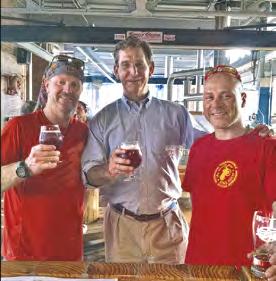
Whitney George, center, poses at a charity bicycle event at Two Roads Brewery in 2015.
Jup Brown
–WHITNEY GEORGE ’76
Whitney George ’76 is chairman of Two Roads Brewing Co. in Stratford, Conn. – but it was the business of beer, not necessarily its sudsy, hoppy qualities, that led him to take the job. After graduating from Trinity College, Whitney headed for Wall Street. “My father was an institutional stock salesman,” he says, “and there was kind of a family history. I thought I could sell things, and stocks would be interesting things to sell. So I became a retail stock broker at Oppenheimer in the fall of 1980. I wasn’t good at it for a while, but managed to survive it. I left Oppenheimer in ’87, landed with my best client in 1991 to become a portfolio manager, and eventually became the co-chief investment officer of Royce & Associates and spent 23 years there.”
Then, in 2011, “a friend of mine, Brad Hittle, came to me with this idea of buying an old factory in Stratford that had made battery casings and was shutting down – and turning it into a brewery. Brad had been in the beer industry his whole life, and was then the chief marketing officer of the Pabst Trust and had brought back Pabst Blue Ribbon, but it was time for him to move on, and he thought the 100,000-square-foot factory would be a perfect place to build a modern brewery.”
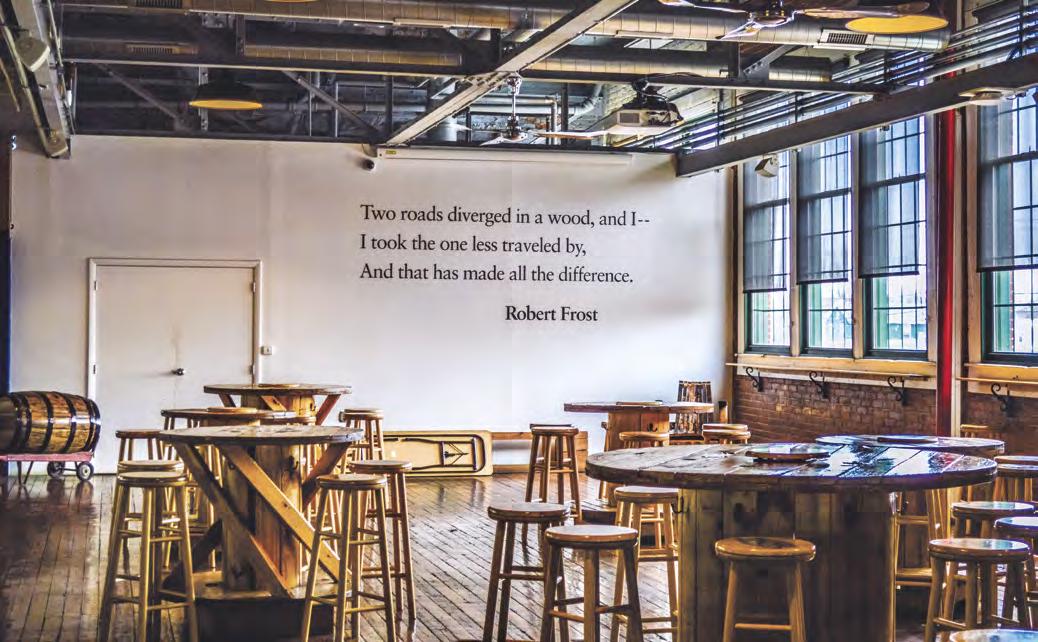
Two Roads is named for the Robert Frost poem “The Road Not Taken” – lines from which are stenciled on a wall in the brewery’s large tap room, as inspiration for creating different brews.
Whitney admits that especially after being a member of a fraternity at Trinity in the late 1970s, he had developed an appreciation for beer. But it was the investment opportunity that really attracted him.
“Brad came to me with this business plan,” says Whitney, “and he had investors ready and had banks lined up, and I thought it was an interesting plan – I’m very interested in business; it’s what I do. I’ve been a portfolio manager for many years and I thought it was a way to diversify my own investments. When I said yes, I’d invest money to kind of get them up and going, the other investors started to get cold feet and demand more, so I said I’ll do all the equity. I’ll make it happen, I’ll backstop the deal, let’s go find a whole bunch of family and friends that might want to invest in this. That was my most important role – getting it off the ground on the financing, because I have no history or background in beer.”
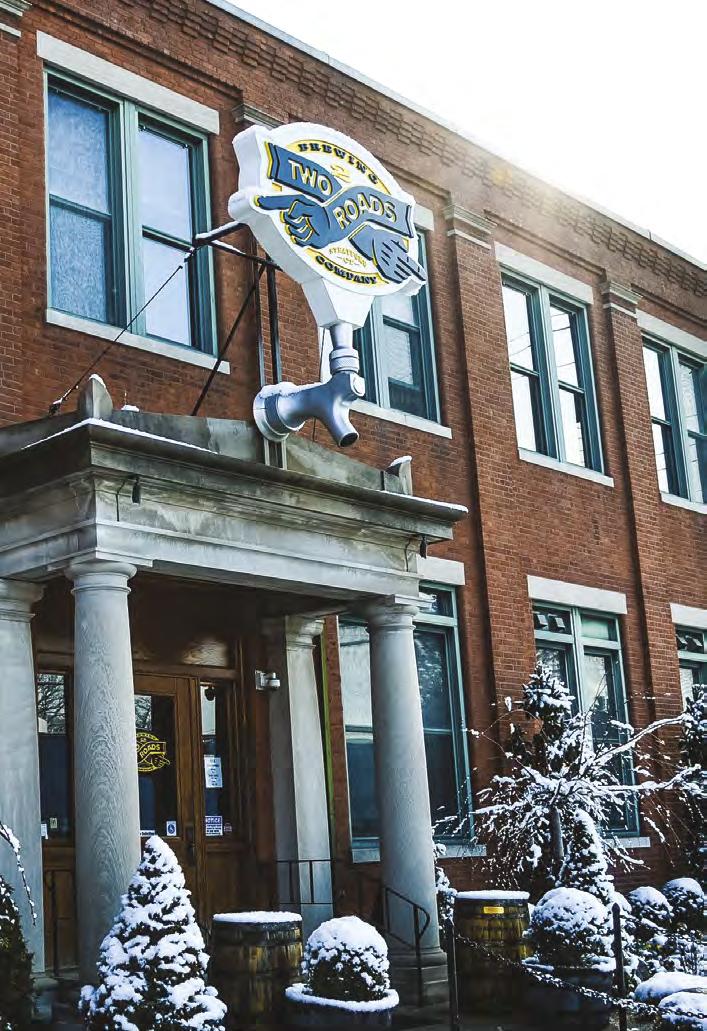
Two Roads, honored as one of the 10 best breweries in America by Paste Magazine, is named for the Robert Frost poem “The Road Not Taken” – lines from which are stenciled on a wall in the brewery’s large tap room, and which serves as an inspiration for creating different brews. The brewmaster is Phil Markowski, one of the people Tod Mott ’76 had competed against in regional competitions. “Phil is a rock star,” Whitney says.
The 1910-era factory had lots of environmental issues, Whitney notes, but by the summer of 2012 new German brewing equipment was brought in and the beermaking began. “At first, he explains, 90 percent of the business was brewing for other people, such as Sean Lawson, whose Sip Of Sunshine IPA is the flagship brew of Lawson’s Vermont company. (Sean’s website tips its hat to Two Roads, citing “the soft, low-mineral profile of the water in Stratford, Connecticut.”) These days, making beer for others is about half of Two Roads’ business.

Although he wears the chairman’s hat at Two Roads, “my main job is being a senior executive at a publicly traded asset manager, Sprott Inc.,” Whitney says. “I’ve been doing that since 2015, and I’m its president and chief investment officer. A lot of my success comes from independent thinking, which goes back to Choate: being a contrarian, going against the grain, looking for opportunities when other people were running away from them.”
Henry McNulty ’65 is a frequent contributor to the Bulletin.


